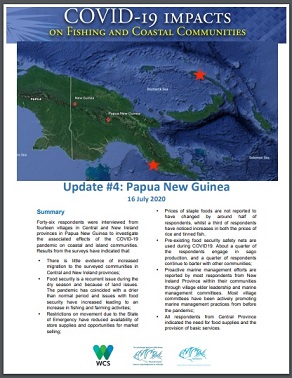
Papua New Guinea (PNG), the largest of the Pacific island nations (population 8.9 million), has not been spared from the COVID-19 pandemic. The government declared a State of Emergency in March, closing off international borders and suspending domestic air travel. Schools were closed, non-essential workers requested to stay at home, and travel between provinces limited to cargo, medicine and security personnel. The general population has been significantly affected and documenting these effects can assist in determining the best way forward for coastal communities in rural PNG. A rapid response survey questionnaire was designed to investigate the initial effects the COVID-19 pandemic has had on coastal and island communities. Staff from the Papua New Guinea Centre for Locally Managed Areas (PNG CLMA) in Central Province (popn. 270,000) and the Wildlife Conservation Society Papua New Guinea program (WCS PNG) in New Ireland Province (popn. 194,000) conducted interviews with male, female and youth key informants to gather more information on impacts that may be associated factors arising from the COVID-19 pandemic. Forty-six respondents were interviewed from fourteen villages in Central and New Ireland provinces in Papua New Guinea to investigate the associated effects of the COVID-19 pandemic on coastal and island communities.












